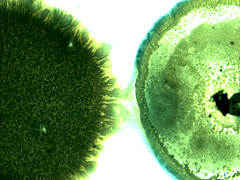Biodiversity loss prohibits necessary evolution of species

Micrographs of colonies of bacteria evolved, illustrating the diversity of forms. Photo: Alexandre Jousset
Note for the media: Use of the pictures provided by iDiv is permitted for reports related to this media release only, and under the condition that credit is given to the picture originator.
“Our study shows that the extinction of species not only reduces current ecosystem functioning and services, but may induce an evolutionary debt as well. It can slow down or prevent the evolution of new species needed to compensate the functions of the ones which went extinct. And at least as important: it may prohibit the evolution of new species needed to adopt to novel challenges such as those associated with global climate change”, Alexandre Jousset, Assistant Professor at Utrecht University explains.
Read more in the press release of the Utrecht University:
http://press.uu.nl/biodiversity-loss-prohibits-necessary-evolution-of-species/
